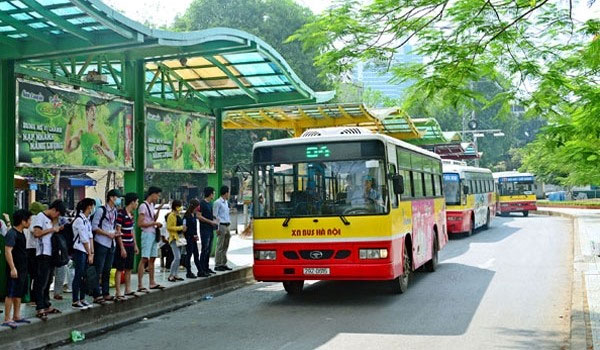[ad_1]
VietNamNet Bridge – Bus routes in Hanoi opened for public bidding this year to reduce reliance on the State budget and improve quality, reported Tien Phong (Vanguard) newspaper.
 |
|
Bus routes in Hanoi opened for public bidding this year to reduce reliance on the State budget and improve quality, reported Tien Phong (Vanguard) newspaper.– Photo baogiaothong.vn
|
“All bus routes in the capital city of Hanoi will be publicly bid for by the year 2020”, said Ngo Manh Tuan, vice director of the Hanoi’s Transport.
“The aim of the move is to reduce the State financial subsidies and enhance the service”, he told the paper.
According to Tuan, the city has 112 bus routes operated by 12 different companies, of which 92 routes are subsidised by the State.
The city plans to open 65 routes for bidding by the year 2020, Tuan said, with the contracts lasting for a term of five years instead of the one as present.
Bidding would help reduce costs by 10-15 per cent per kilometer, he said.
Bids have been held for 16 routes since 2012. Per the schedule, 17 routes more will be bid on by the end this year, 20 routes next year and 28 routes in 2020.
Vice director of Urban Traffic Management Centre, Thai Ho Phuong told Kinh Te & Do Thi (Economy & City) Newspaper that “the 16 bus routes were transparently bid on and saved the State budget VND65 billion (USS$2.8 million) from subsidies.”
After several months of implementation, the route bidding had attracted different reactions.
According to Kinh Te & Do Thi, many experts said the old mechanism of nominating companies to operate bus routes had increased State subsidies and hamstrung the development of bus companies.
This was because small-scale private businesses could not compete with big firms.
However, many businesses which were ordered to operate bus routes raised concerns about the bidding.
They argued that after 10 years of development, Hanoi’s buses had met 12 per cent of passengers’ demand, up from meeting 1 or 2 per cent.
In the coming years, buses must take 20 to 24 per cent of travel demand, due to the city’s plan to limit personal vehicles.
To fulfill the task, bus companies needed a stable policy for developing.
When ordered, the businesses had made efforts to meet the city’s requirements and paid hundreds of billions of dong to invest into vehicles and staff.
With the new mechanism, the businesses might lose the bids, which would leave them stuck with employees, vehicles and loans with no business.
Meanwhile, other businesses were lukewarm on the bidding mechanism.
Dr Dang Minh Tan from the University of Transport said that “at present, standards and criteria for routes for bidding had caused hesitation for businesses”.
The operation term of five year was an example, he said.
“To win the bids, businesses had to invest in buying new vehicles and hiring staff. It meant big investment getting small and slow profits. And they would face difficulties after the terms were due”, Tan said.
To comfort the businesses, the city Transport Department suggested that companies should carefully weigh their business plans.
Fixing terms of five-year operation aimed at ensuring service quality.
Meanwhile, Tan suggested that management should adjust the operation terms to routes which have few passengers as an incentive for businesses.
Source: VNS
| related news |
[ad_2]
Source link
